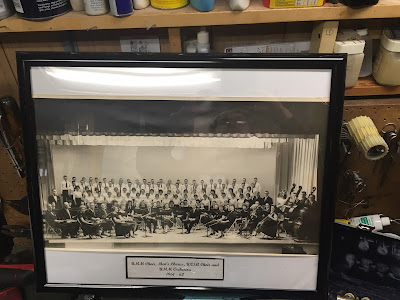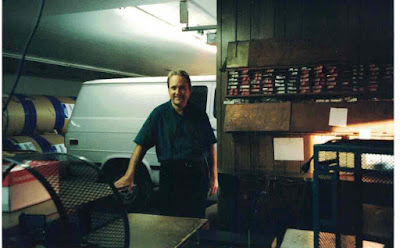 |
| Your blog host with country singer Jo Dee Messina in Goodlettsville TN |
Diffie was totally country, a genre that puts itself forward as reaching the common people. Among his many accomplishments, he co-wrote singles for Holly Dunn, Tim McGraw and Jo Dee Messina. You see Jo Dee in the photo that accompanies this post. I was delighted to be able to pose with her as her "run" got going in 1997.
Stock-in-trade of the genre
Call it middle class or whatever, maybe lower middle class but symbols abound. Song lyrics make reference to the "Ford Fairlane," a vehicle for the everyman. In a later time, the Chevy Citation? WCCO's "Dark Star" said that the Citation would start falling apart at 65,000 miles, no matter where it was!
Cute: "They want to see my Fairlane up on blocks, and the holes in all our socks."
The sincerity of some of these lyrics can be questioned. The great bandleader Stan Kenton made an issue of that once, back around 1980 as I recall. Country stars sing about being deprived but not in a way that evokes real concern. Rather, we are supposed to be amused or charmed by the "Po' Folks." Hey, these people can be happy amid their challenges. All they have to do is find God or whatever.
Country music has its share of charlatans like any artistic field I guess. Such people spin the misleading image of poor people who don't seem to give a damn about their circumstances.
Bill Anderson is supposed to reflect the heart and soul of country music. May lightning strike me if I were to suggest he's a charlatan. His talent is genuinely enormous. I had occasion to interview him when he came to Morris. One of the songs that lifted "Whispering Bill" to fame was "Po' Folks." He gave us the common imagery of such people. This is coupled with the common suggestion that they find a sort of bliss, as if material shortcomings might call for a mere shrug.
Giving these songwriters the benefit of the doubt, maybe they're just suggesting we should seek happiness regardless of our limitations in this life. Songwriters are always advised to accentuate the positive. But then we have folk singers who really try to suggest that we ought not be complacent about the poor. Perhaps there ought to be hints about revolution.
Listen to Lucinda Williams tune
Rich people would say you can't just re-distribute wealth. So we get into the whole political tug of war. How many country songs pull at our heartstrings with reference to the "18 wheels" of truck driving? Truck drivers are a symbol of the gritty working man's life, right? To be admired to the utmost. One of my favorite songs, "He Never Got Enough Love," makes such a reference. The song is associated with Lucinda Williams who co-wrote it with Betty Elders. We can just imagine Jerry Reed as we read the lyrics:
His daddy used to drive those 18 wheelers
Now he drives the bottle deep into the night
He was always saying son, you're just no good
You'll never do anything right
Ah, "the bottle," another staple of traditional country-western. I wonder if this has lost some of its appeal due to our society drifting away from social drinking. We are far less tolerant of the idea of alcohol being a "crutch." More than ever it is not an acceptable escape or excuse. But maybe there was just symbolism all along: despair. "The bottle" suggested an escape from all our worldly travail.
 |
| Here's a photo I took on Broadway in Nashville |
Making money from artistic talents can I'm sure be very stressful. Art after all is supposed to have intrinsic rewards, it is supposed to spring organically. We are inspired. Yet the time comes to deal with all the vicissitudes of "business."
I recall the Nashville songwriter who in a documentary said of his field: It knocks you down 50 times, hoping you won't get back up, but then if you do, you might find you succeed.
Science, which purports to explain everything, has a hard time explaining how art succeeds in the marketplace. Is there any better example than songwriting? What's the key? I remember Mac Davis saying "sometimes God just whispers in your ear." What this suggests to me is that Davis has no idea what the real building blocks are.
I am struck by how when you're in Nashville and tell people you write songs, the response is always the same: "How many songs have you written?" It's uncanny. This is a way of separating the wheat from the chaff. Successful artists respond to an innate desire to write songs, to the extent they go on and on, even if getting "knocked down 50 times," which invariably happens. Fifty is a conservative number!
Songwriting has been described as a drug. How can such a rough-hewn and downright dangerous individual like Johnny Paycheck write such absolutely stellar art as his song "Old Violin?" Isn't it amazing?
An afterthought re. the "18 wheels": what happens when the self-driving trucks take over?
The public wants fresh stuff
It's sad to realize the transitory nature of popular songs, how they come and go on "the charts." We get tired of our favorite songs and want to hear new ones. Or on a broader scale, we get tired of a genre or style and seek something different. So I'm reminded of how Chuck Mangione, a brass instrument player like me, had his time in the sun of popularity. It was his "run," good even for getting on the Phil Donahue show! He had his gimmick of looking rather like a hippie. His "money" tune was "Feels so Good." Radio DJs all over America had decided they were sick of the BeeGees. They discovered Mangione and his style to be a most suitable contrast, and the rest is history.
Even my childhood idol, the jazz-oriented Maynard Ferguson, had a brief flash in front of the broad public with "Theme From Rocky," remember? Ferguson had gotten on the disco wave, guided by his studio handlers. His disco album "Primal Scream" disappointed a lot of us fans who were expecting more of his standard stuff. Eventually he left the shackles of Columbia Records and went to smaller labels that gave him more creative freedom. In the meantime, his flash of fame from "Rocky" and disco sure didn't hurt him. I heard him in Dawson MN in 2005 not long before he passed away. He succumbed to an abdominal infection.
Visiting heart and soul of country
I'm proud to say I have hung out some at Tootsie's Orchid Lounge on Broadway in Nashville. It's across the alley from the historic Ryman Auditorium. Maybe some songwriting genius could emanate from the walls of Tootsie's and give me a boost? Well, it's fun to think about.
Nashville music people are great to know. They are honest and will share openly if they wish to criticize a particular creative work. Sherwin Linton said of my songwriting efforts that I was a "topical songwriter." Definitive? Wikipedia says a topical song comments on political/social events. Seems apropos in connection to yours truly, and indeed my song about the First Minnesota Regiment in the Civil War would be an exhibit. I speak of the virtue behind the Minnesotans' cause, the grand nature of their sacrifice. I refer to "the men of Alabama, wearing Southern gray" in a manner that is not disrespectful. The men were products of their culture.
Many people have listened on YouTube to my song "Take Those Colors" about the First Minnesota. Some positive comments posted too. Thanks to all who have listened. The song was recorded at the Nashville studio of Frank Michels. I contacted Frank recently to see if he and his associates were OK after the tornadoes. He said yes as the adverse weather was "on the other side of town."
Now with Joe Diffie having been struck down by the virus, we must worry about the Nashville-based music community. I pray for Frank and everyone. For the time being I will have no more songs recorded. Diffie charted 35 singles between 1990 and 2004, five ascending to No. 1. He released seven studio albums. Joe Diffie RIP.
A song toward our own community
I'll conclude here with my lyrics for "Morris Minnesota," a song I could maybe put forward as a reflection of our Sesquicentennial which is set for 2021. Who knows if we'll even celebrate it? Number one, how will our whole world change as a result of the current circumstances? Will we land on our feet? Will we be in a dystopian world? Secondly, does our community of Morris MN give a rip about community celebrations any more? This is a pretty serious question. But regardless, I'm proud to have written "Morris Minnesota." So here are the words:
"Morris Minnesota"
by Brian Williams
The covered wagons rumbled westward on their way
Prairie grass as far as you could see
The Civil War was over, muskets put away
Now our nation sought its destiny
The railroad with its puffing smoke brought a whole new day
Now a town was in its infancy
And though we seemed like vagabonds from another place
Morris was as happy as could be
CHORUS:
Morris, Minnesota, opening new vistas
We would like to show ya our prosperity
We have education, farming and tradition
Surely we can sell ya on Morris, Minnesota
A campus got established on the edge of town
For the Indians it was meant to be
They faced a whole new world brimming all around
Still they had a passion to be free
And then we got the ag school for the farming life
All those kids with farming energy
They came from all the good soil you could hope to find
Still they had to learn their ABCs
(repeat chorus)
The U of M came calling for a brand new day
Ski-U-Mah, I don't know that that means
The UMM men's chorus sang for all who came
Fans were rabid for the Cougar teams
A graduate of the ag school cloaked himself in fame
Pitching for the Mets in '69
He led them to the title, winning all those games
Jerry Koosman could not be denied
(repeat chorus)
The old dirt trails have faded, mostly they are gone
Just imagine campfires in the night
And just like then we feel resolve as we greet the dawn
Morris, Minnesota sees the light
We have a sense of purpose not just for ourselves
Searching in a way that never fails
Inspired by those early folk answering the bell
On the rugged, lonely Wadsworth Trail
(repeat chorus)
- Brian Williams - morris mn minnnesota - bwilly73@yahoo.com










